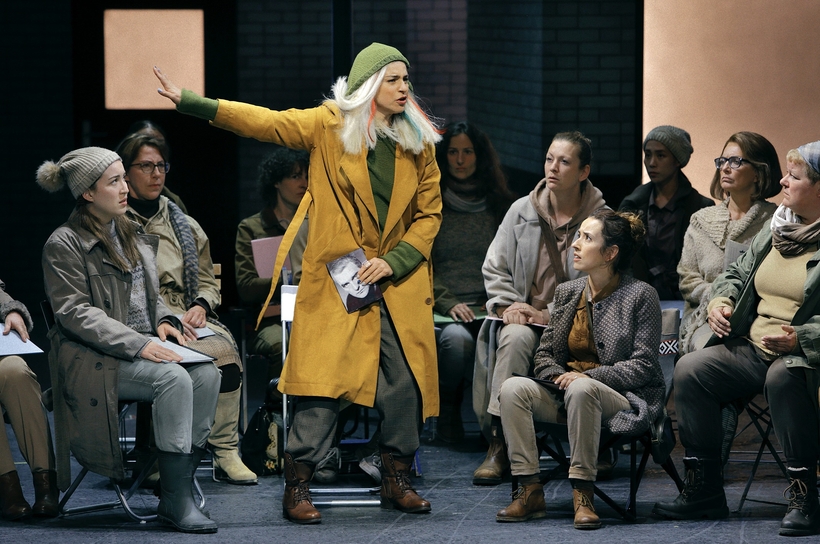The Flying Dutchman spins the yarn of a phantom ship doomed to sail the seas forever, but there’s an escape clause. All the captain has to do is find a woman who will be true to him unto death. Once every seven years, he gets to look for her.
Suit the action to the word? Top-drawer opera directors of our day won’t hear of it. In the summer of 2021, the sought-after Moscow native Dmitri Tcherniakov dropped anchor for the first time at the Bayreuth Festival and gave the Wagnerite mecca a Flying Dutchman bereft of ships, sailors, and sea. The live video zooms in on a flat, colorless dullsville, where rednecks brood over their pints at a bar. The women kill time at choir practice, sheet music in hand, rehearsing the Spinning Chorus from The Flying Dutchman (duh) with nary a spinning wheel in sight.
As usual, Tcherniakov superimposes a narrative of his own, this time an orphan’s revenge on the bigoted townsfolk who slut-shamed his mother to suicide. The back story unfolds in mime during the overture. After that, nothing fits, yet a supercharged performance by the Lithuanian soprano Asmik Grigorian, in her Bayreuth debut, generates its own force field if not its own logic.
Grigorian portrays Senta, the daughter of a sea captain with dollar signs in his eyes. Rather than the high-strung, otherworldly romantic of tradition, Grigorian embodies a teenage hellcat: moody, mocking, bossy, abrasive, emotionally abusive, spoiling for a fight. Yet at the same time, we’re in the presence of a musician of highest refinement, unerringly in tune, ardent yet smooth in projection, clairvoyant in her reading of the words. All that, plus she never screams.
Dramatically, Grigorian keeps many secrets. When Dad brings the rich Dutchman home for dinner, this Senta breaks out in gales of laughter. Why is that? And much as she loathes the aged Nurse whom Tcherniakov turns into Senta’s rifle-toting surrogate mother, Grigorian’s Senta shows the older woman a strange sisterly compassion at the out-of-nowhere dénouement.
As Daland, Senta’s father, the frequent showstopper Georg Zeppenfeld is merely very fine. As the Dutchman, John Lundgren relies on quaking dramatic intensity to mask fraying vocal power, which sometimes works. As Erik, the landlubber whose hopes Senta dashes, Eric Cutler does a better job reconciling his character’s anguish with the anguish in the music. The incidental role of the Steersman of Daland’s ship falls to Attilio Glaser, who embraces his pretty tunes with exuberant joie de vivre.
Hidden in Bayreuth’s covered orchestra, Oksana Lyniv of Ukraine made history as the festival’s first female conductor. On the plus side, she’s a whiz at matching the dramatic pulse to Wagner’s shifts in instrumental color and texture. On the debit side, there’s no overlooking the frequent slippage between the stage and the pit.
Der Fliegende Holländer is available for streaming on the Stage+ Web site
Matthew Gurewitsch writes about opera and classical music for AIR MAIL.He lives in Hawaii

